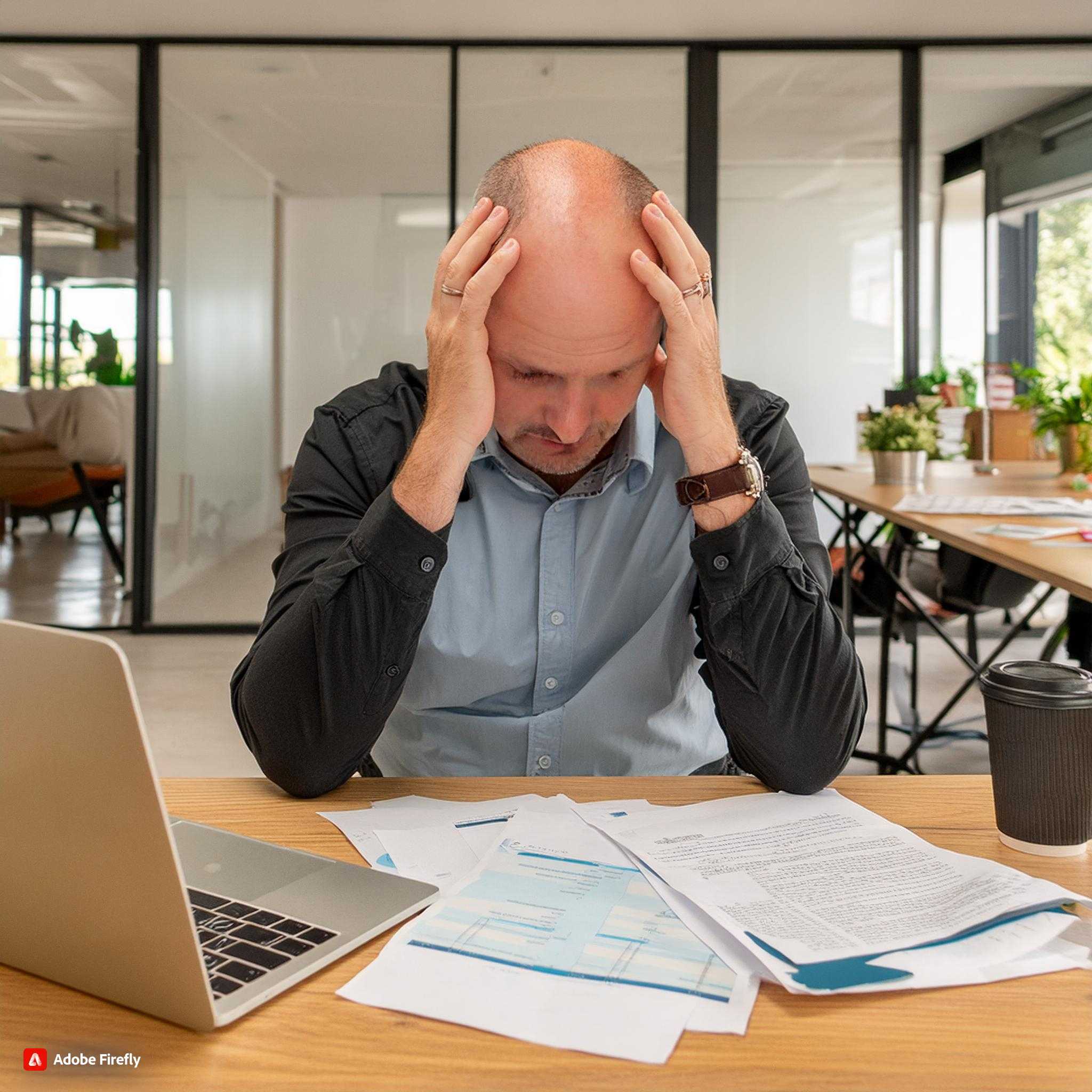
Amelia Thompson, MD
Dec 11, 2023
How Stress and Anxiety Contribute to Men’s Hair Loss



How Stress and Anxiety Contribute to Men’s Hair Loss
Hair loss is a common issue that many men face, and while genetics play a crucial role, stress and anxiety can significantly exacerbate the problem. Understanding the connection between stress, anxiety, and hair loss can help you take proactive steps to manage your mental health and maintain healthier hair. Let's explore how stress and anxiety contribute to hair loss and what you can do to mitigate their effects.
The Connection Between Stress, Anxiety, and Hair Loss
Stress and anxiety can trigger hair loss through various mechanisms. Here are the main ways they affect your hair health:
Telogen Effluvium
Telogen effluvium is one of the most common types of stress-induced hair loss. When you're stressed, your body can push a large number of hair follicles into the resting phase (telogen). After a few months, these hairs may fall out, leading to noticeable thinning.
Trigger: Significant stressors such as major life changes, trauma, or prolonged anxiety.
Symptoms: Diffuse thinning across the scalp, noticeable when washing or brushing hair.
Alopecia Areata
Alopecia areata is an autoimmune condition where stress and anxiety can trigger the immune system to attack hair follicles, resulting in patchy hair loss.
Trigger: Severe stress or emotional distress can precipitate the onset of alopecia areata.
Symptoms: Round, smooth patches of hair loss on the scalp or other parts of the body.
Trichotillomania
Trichotillomania is a condition where individuals compulsively pull out their hair due to stress and anxiety, leading to hair loss.
Trigger: Stressful situations or feelings of anxiety often lead to hair-pulling behavior.
Symptoms: Noticeable hair loss in patches where hair has been pulled out.
Chronic Stress
Long-term stress can impact your overall health, including hair health. Chronic stress can lead to hormonal imbalances, nutritional deficiencies, and a weakened immune system, all of which can contribute to hair loss.
Trigger: Ongoing stressful situations, such as work pressure, financial issues, or relationship problems.
Symptoms: Gradual thinning of hair and overall reduction in hair quality.
Managing Stress and Anxiety for Healthier Hair
While it’s impossible to eliminate all stress from your life, managing it effectively can help minimize its impact on your hair. Here are some strategies to consider:
Regular Exercise
Exercise is a powerful stress reliever. It promotes the release of endorphins, which can improve your mood and reduce anxiety.
Tips: Aim for at least 30 minutes of moderate exercise most days of the week. Activities like jogging, swimming, or yoga can be particularly beneficial.
Healthy Diet
A balanced diet supports overall health and can help mitigate the effects of stress on your body and hair.
Tips: Include plenty of fruits, vegetables, whole grains, lean proteins, and healthy fats in your diet. Foods rich in omega-3 fatty acids, vitamins, and minerals are especially beneficial for hair health.
Adequate Sleep
Quality sleep is essential for stress management and overall well-being. Poor sleep can exacerbate stress and contribute to hair loss.
Tips: Aim for 7-9 hours of sleep per night. Establish a relaxing bedtime routine and maintain a consistent sleep schedule.
Mindfulness and Meditation
Practicing mindfulness and meditation can help you manage stress and anxiety effectively.
Tips: Incorporate daily mindfulness practices, such as deep breathing exercises, guided meditation, or progressive muscle relaxation.
Professional Support
If stress and anxiety are overwhelming, seeking professional support can be crucial. Therapists, counselors, or support groups can provide valuable tools and strategies to cope with stress.
Tips: Don’t hesitate to reach out to a mental health professional if you need help managing your stress and anxiety.
Healthy Hair Care Routine
Treating your hair gently can help prevent additional stress-related damage.
Tips: Use mild hair care products, avoid excessive heat styling, and handle your hair gently when washing and brushing.
Take Control of Stress for Better Hair Health
Stress and anxiety can significantly impact your hair health, but by understanding the connection and taking proactive steps to manage your stress, you can help reduce hair loss and promote healthier hair growth. Incorporate these stress-management strategies into your daily routine to support both your mental well-being and your hair health.
Take the first step towards healthier hair and a stress-free life. Get your personalized plan on our website today!
How Stress and Anxiety Contribute to Men’s Hair Loss
Hair loss is a common issue that many men face, and while genetics play a crucial role, stress and anxiety can significantly exacerbate the problem. Understanding the connection between stress, anxiety, and hair loss can help you take proactive steps to manage your mental health and maintain healthier hair. Let's explore how stress and anxiety contribute to hair loss and what you can do to mitigate their effects.
The Connection Between Stress, Anxiety, and Hair Loss
Stress and anxiety can trigger hair loss through various mechanisms. Here are the main ways they affect your hair health:
Telogen Effluvium
Telogen effluvium is one of the most common types of stress-induced hair loss. When you're stressed, your body can push a large number of hair follicles into the resting phase (telogen). After a few months, these hairs may fall out, leading to noticeable thinning.
Trigger: Significant stressors such as major life changes, trauma, or prolonged anxiety.
Symptoms: Diffuse thinning across the scalp, noticeable when washing or brushing hair.
Alopecia Areata
Alopecia areata is an autoimmune condition where stress and anxiety can trigger the immune system to attack hair follicles, resulting in patchy hair loss.
Trigger: Severe stress or emotional distress can precipitate the onset of alopecia areata.
Symptoms: Round, smooth patches of hair loss on the scalp or other parts of the body.
Trichotillomania
Trichotillomania is a condition where individuals compulsively pull out their hair due to stress and anxiety, leading to hair loss.
Trigger: Stressful situations or feelings of anxiety often lead to hair-pulling behavior.
Symptoms: Noticeable hair loss in patches where hair has been pulled out.
Chronic Stress
Long-term stress can impact your overall health, including hair health. Chronic stress can lead to hormonal imbalances, nutritional deficiencies, and a weakened immune system, all of which can contribute to hair loss.
Trigger: Ongoing stressful situations, such as work pressure, financial issues, or relationship problems.
Symptoms: Gradual thinning of hair and overall reduction in hair quality.
Managing Stress and Anxiety for Healthier Hair
While it’s impossible to eliminate all stress from your life, managing it effectively can help minimize its impact on your hair. Here are some strategies to consider:
Regular Exercise
Exercise is a powerful stress reliever. It promotes the release of endorphins, which can improve your mood and reduce anxiety.
Tips: Aim for at least 30 minutes of moderate exercise most days of the week. Activities like jogging, swimming, or yoga can be particularly beneficial.
Healthy Diet
A balanced diet supports overall health and can help mitigate the effects of stress on your body and hair.
Tips: Include plenty of fruits, vegetables, whole grains, lean proteins, and healthy fats in your diet. Foods rich in omega-3 fatty acids, vitamins, and minerals are especially beneficial for hair health.
Adequate Sleep
Quality sleep is essential for stress management and overall well-being. Poor sleep can exacerbate stress and contribute to hair loss.
Tips: Aim for 7-9 hours of sleep per night. Establish a relaxing bedtime routine and maintain a consistent sleep schedule.
Mindfulness and Meditation
Practicing mindfulness and meditation can help you manage stress and anxiety effectively.
Tips: Incorporate daily mindfulness practices, such as deep breathing exercises, guided meditation, or progressive muscle relaxation.
Professional Support
If stress and anxiety are overwhelming, seeking professional support can be crucial. Therapists, counselors, or support groups can provide valuable tools and strategies to cope with stress.
Tips: Don’t hesitate to reach out to a mental health professional if you need help managing your stress and anxiety.
Healthy Hair Care Routine
Treating your hair gently can help prevent additional stress-related damage.
Tips: Use mild hair care products, avoid excessive heat styling, and handle your hair gently when washing and brushing.
Take Control of Stress for Better Hair Health
Stress and anxiety can significantly impact your hair health, but by understanding the connection and taking proactive steps to manage your stress, you can help reduce hair loss and promote healthier hair growth. Incorporate these stress-management strategies into your daily routine to support both your mental well-being and your hair health.
Take the first step towards healthier hair and a stress-free life. Get your personalized plan on our website today!
© 2024 Hairful. All rights reserved.
© 2024 Hairful. All rights reserved.
© 2024 Hairful. All rights reserved.